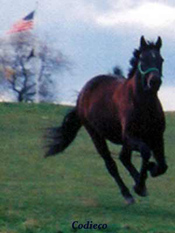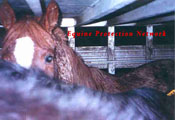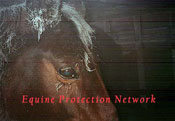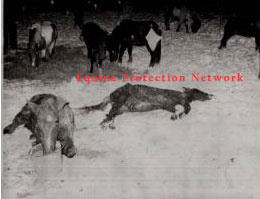
Shop for CD's at CDRush.com & the EPN Benefits!
Put "EPN" in the Coupon Code box when you place your order.
Now you can save money on your favorite music and help the horses at the same time!
EPN Website Sections
Press Stories 1980-2004
Caution Horses For Slaughter
by Heather Chapin-Fowler of the Corral Staff
The Final Roundup Pittsburgh Magazine 5 /2004
Fighting to Stop the Sale & Slaughter of US Horses in Foreign Countries - KDKA TV Investigates 4/30/2004
The Slaughter Question Horse & Rider 12/2002
State Ranks High in Equine Slaughter WTAE's Paul Van Osdol Reports 4/27/2001
Slaughterhouse Ride WISH TV News 8 I-Team Investigative Report 4/2001
Illinois Defeats Horse Slaughterhouse! 1999
Kill Sale Pittsburgh Post Gazette 6/ 1999
Horses To Slaughter
Police, vet check horses' health at New Holland sale
July 1998
PA Horse Transport Legislation - Act 64 of 2001
Horse Transport Bill Passes Unanimously WTAE's Paul Van Osdol Reports 6/21/2001
State Lawmakers Urged to Protect Horses en route to Slaughterhouses
June 1998
State Concerned with Cruelty to Horses Taken for Slaughter
'TRAIL OF TORTURE' ?
June 1998
Horse-Slaughter Industry Critics Pushing Changes
PA. Bill Would Help Protect Horses Headed to Slaughter
March 28, 1998
The goal is a humane trip for horses on the way to be killed for their meat, prized in Europe.
New York Does PA's Dirty Work January 1998
NYSP Stop Double Deck Trailer

Horses inside double deck cattle trailer stopped by the NYSP. The owner was later convicted & fined $3000.00.
Horse Popsicle Case 1994
Cruel Transport Results in $11,100 Fine

Horses inside double decker covered with frost.
The Last Ride
Eyewitness Account of trip to Slaughterhouse
Overcrowding, negligence plague Shelby horse feedlot
Great Falls Tribune 8/10/2003
The Torture Trail
December 1980
85 horses in trailer, 57 survive

A dead horse lies in the snow, while another too weak to rise eats from a bucket.
The Miracle Mile July 1990
Pregnant Mare Foals Hours After Rescue From Slaughterhouse-
Foal is a Stakes Winner!
 Pasturemate of the Stakes Winner, "On Route 66" who was born only hours after her dam was taken from a slaughterhouse
Pasturemate of the Stakes Winner, "On Route 66" who was born only hours after her dam was taken from a slaughterhouse
PA Dealer Sent to Prison 1999
Shady Horse Dealing
Renaissance Bob 12/ 1998
Rescue of a Racehorse
An Eye For An Eye
Story of Catch-22

Links
California Voters "Just Say Neigh" to Horse Slaughter!
HoofPAC
Shop online at IGive.com with over 600 great stores you know & love- including Back In the Saddle! Up to 26% of the purchase price is donated to the EPN!
The EPN gets $5 extra the first time you shop!
PayPal accepts credit cards! Please send your tax deductible donation to the:Equine Protection Network, Inc.,
P. O. Box 232, Friedensburg, PA, 17933.
HoofPAC is the political action committee that has been formed to end the slaughter of America's horses. Cathleen Doyle, founder of HoofPAC, led the successful Save The Horses campaign in 1998 that made the slaughter of California's horses a felony.

State lawmakers are urged to protect horses en route to slaughterhouses
Gettysburg Times
By DEBRA BROWNLEY-Times Correspondent
"How much worse to invite injury and death by cramming horses together in a tight, too-low space with no place for the timid to retreat to, and no way for a mother to protect her own baby from the fearful trampling of other horse's feet," said Carol Chapman, owner of The Last Refuge, a horse rescue center in Connecticut. "The babies go down and others stand on them, the weak go down, and their blood stains the feet of the stronger. Stallions madly attack all that they perceive as aggressors to their territory, and the screams of the strongest of the fear-crazed animals does not drown out the anguished cries of the weaker."
Chapman was referring to the conditions in which horses are currently being transported to slaughter under Pennsylvania law. She, along with several other animal rights activists, gave testimony on Thursday in the Gettysburg Hotel, where they urged members of the House Judiciary Committee to consider improvements to the existing law that would put an end to the cruel and inhumane way horses are transported to slaughter in this state.
Horses are big business in Pennsylvania, ranking just behind the dairy industry. According to one activist, "This state is also the home of the largest weekly horse slaughter sale east of the Mississippi" - referring to New Holland Sales Stables in Lancaster County.
On an average, New Holland runs about 250 horses through the sale each week. And although the sales stable deals in very good, healthy horses, a large number of these horses are destined for foreign-owned slaughterhouses in Texas and Canada for human consumption overseas.
More than 100,000 horses are killed each year in slaughterhouses throughout the nation with about 20 tons of horse meat being shipped to countries like France and Japan, where it is considered a delicacy. European countries will pay as much as $4 to $5 per pound for horse meat.
"Currently horses are transported in trailers designed for cattle and hogs, including double-deckers," said Christine Berry, director of the Equine Placement Network in Friedensburg, who also gave testimony. "Horses of all ages, breeds and sexes are transported together with no food, water or rest to Canada or Texas, journeys of 550 miles and 1,500 miles respectively."
The average price of horses sold to slaughterhouses bring between $800 to $1,000, which encourages dealers to pack as many horses as possible into a trailer and transport them across state lines.
Curtis Lange and Vance Berry of BrookLedge Horse Transportion have been hauling horses commercially for more than 40 years, and they stated that it was "unacceptable for any animal to be brutalized and tortured before being slaughtered." They also testified to seeing as many as 60 to 70 horses crammed into a trailer with no ventilation, designed to haul 20 to 25 comfortably.
Lange said that he recently witnessed a dealer using "electric cattle prods, brutal whippings, and if a horse had too many broken limbs, he would put a rope around its neck and drag it on the trailer."
Under a new Bill (HB 2127), introduced by Rep. James Lynch, R-65th, inhumane practices such as transporting horses to slaughter in two-tier trailers with ceilings to low for them to stand upright would be banned. Horses would have to be able to stand unassisted, and any animal injured during transport would have to be examined by a veterinarian. Horses would also have to be given water and two hours of rest for every 12 hours of transport. Further, the bill would ban the taping of mouths and eyes, and prohibit transporting other animals with horses.
"Only an inverted moral society can condone what is happening with these horses as normal. It's wrong," Lynch said. "I think our society has passed the point when we need to treat living creatures this inhumanely."
So why segregate just horses? Why not include other animals as well in this bill? Because, according to Rep. Sara Steelman, R-62nd: "Cattle, hogs and sheep have been bred for centuries to endure different conditions. Horses are different psychologically. They are forced into an environment that they haven't been bred to tolerate, which creates more stress."
Why is it so disturbing? Because it's being done incorrectly, Steelman added.
Other states, like New York, have had similar bills passed and enforced for17 years. New York State Trooper Thomas Garcia also gave testimonial on Thursday. He stated that "over the course of 14 years, (I know) of at least 203 arrests regarding illegal transportation of horses, many of which came from the auction in New Holland."
"Many 'killer buyers' will travel at night because they know that a lot of the laws in some states don't allow this type of transport,"
said Dr. Robert Lopez, a veterinarian who is also the president of the North Country S.P.C.A. in New York.
 Lopez recalled being called out by New York state troopers on a call with possible dead horses in a trailer. When he arrived, he saw the head of a dead pony sticking out of the slats, frozen with its tongue hanging out. He took a flashlight, and could see the other down horses, so he, along with the troopers, proceeded to unload them from the trailer.
Lopez recalled being called out by New York state troopers on a call with possible dead horses in a trailer. When he arrived, he saw the head of a dead pony sticking out of the slats, frozen with its tongue hanging out. He took a flashlight, and could see the other down horses, so he, along with the troopers, proceeded to unload them from the trailer.
"The horses started eating the snow by the bucket fulls. Some horses would eat a couple of laps of snow, and then they just died ...," Lopez said.
Animal rights activists continued to give testimony throughout the afternoon, and made several recommendations for amendments to the bill, including that vehicle safety specifications must apply to all horses, not just slaughterbound; the definition of an intermediate handler must be added; and it must be stated that each horse is a separate offense, and that small fines would not deter the illegal shipment of horses.
"I think this is a very significant issue, and I'm very interested in the testimony today to learn where we can amend the bill to make it more efficiently accomplish its goals," said Rep. Steve Maitland, R-90th, a co-sponsor of the bill.
Lynch added that he plans on reintroducing the bill in December or January with some minor changes, and that he thinks the bill will move.
Save America's Horses!
|
||||

